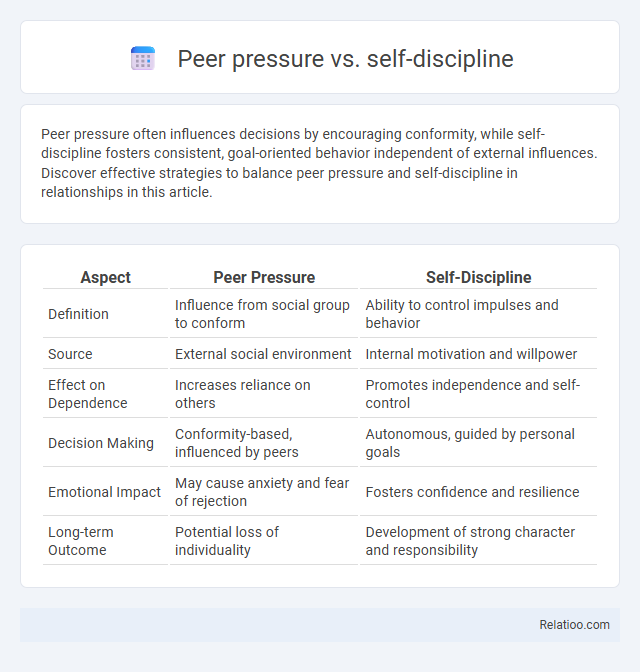Peer pressure often influences decisions by encouraging conformity, while self-discipline fosters consistent, goal-oriented behavior independent of external influences. Discover effective strategies to balance peer pressure and self-discipline in relationships in this article.
Table of Comparison
| Aspect | Peer Pressure | Self-Discipline |
|---|---|---|
| Definition | Influence from social group to conform | Ability to control impulses and behavior |
| Source | External social environment | Internal motivation and willpower |
| Effect on Dependence | Increases reliance on others | Promotes independence and self-control |
| Decision Making | Conformity-based, influenced by peers | Autonomous, guided by personal goals |
| Emotional Impact | May cause anxiety and fear of rejection | Fosters confidence and resilience |
| Long-term Outcome | Potential loss of individuality | Development of strong character and responsibility |
Understanding Peer Pressure: Definition and Types
Peer pressure involves social influence exerted by peers to encourage conformity to group norms, which can be positive or negative. Understanding its types--such as direct pressure, where peers explicitly encourage behavior, and indirect pressure, stemming from the desire to fit in--helps differentiate it from self-discipline, which is an internal regulatory mechanism. Recognizing these distinctions is crucial for developing strategies to resist negative peer influence while fostering self-discipline.
The Essence of Self-Discipline
Self-discipline is the internal drive that empowers you to resist negative peer pressure and make choices aligned with your goals and values. Unlike peer pressure, which often leads to impulsive decisions influenced by others, self-discipline fosters long-term success through consistent effort and self-control. Mastering self-discipline strengthens your ability to maintain focus and integrity despite external social influences.
How Peer Pressure Influences Decision-Making
Peer pressure significantly impacts decision-making by altering individual behavior to align with group norms, often leading to choices driven by the desire for social acceptance rather than personal values. This influence can override self-discipline, especially in adolescents, causing impulsive or risky decisions. Understanding the psychological mechanisms behind peer pressure is crucial for developing strategies that strengthen self-discipline and promote autonomous decision-making.
Benefits of Cultivating Self-Discipline
Cultivating self-discipline fosters resilience and enhances decision-making, enabling individuals to resist negative peer pressure effectively. It promotes long-term goal achievement by encouraging consistent effort and focus, which peer pressure often disrupts with impulsive behaviors. Developing strong self-discipline supports emotional regulation and personal accountability, leading to greater overall well-being and success.
Negative Impacts of Peer Pressure on Personal Growth
Peer pressure can significantly hinder your personal growth by encouraging conformity and discouraging independent decision-making, which undermines self-discipline. Exposure to negative peer influences often leads to risky behaviors, reduced self-esteem, and diminished motivation to pursue individual goals. Developing strong self-discipline is essential to resist these pressures and foster resilience and authentic personal development.
Strategies to Overcome Peer Pressure
Strategies to overcome peer pressure include building strong self-discipline by setting clear personal goals and values, which empower individuals to resist external influences. Developing assertiveness skills enables confident refusal of negative behaviors promoted by peers. Surrounding oneself with supportive friends and engaging in activities that align with positive values further reinforce decision-making independent of peer pressure.
Building and Strengthening Self-Discipline Habits
Building and strengthening self-discipline habits requires prioritizing your own goals over external influences like peer pressure. Developing consistent routines and setting clear boundaries helps you resist negative social pressures and maintain focus on long-term success. Cultivating self-awareness and accountability empowers you to make decisions aligned with your personal values and aspirations.
Peer Pressure vs Self-Discipline: Key Differences
Peer pressure often compels individuals to conform to group behaviors, potentially leading to risky or negative choices, whereas self-discipline empowers you to control impulses and make decisions aligned with personal goals and values. The key difference lies in external influence versus internal control, with peer pressure relying on social dynamics and self-discipline emphasizing personal accountability. Developing strong self-discipline helps resist negative peer pressure, fostering resilience and independent decision-making.
Real-Life Examples: Success Stories and Lessons Learned
Real-life examples reveal how self-discipline enables individuals to resist negative peer pressure, such as athletes maintaining rigorous training despite teammates engaging in harmful behaviors. Success stories like Oprah Winfrey's journey highlight the power of self-discipline to overcome peer influence and achieve long-term goals. Observing these lessons shows how You can develop resilience, making choices that align with personal values despite external pressures.
Empowering Yourself: Choosing Self-Discipline Over Conformity
Empowering yourself involves embracing self-discipline to resist the influence of peer pressure, fostering personal growth and authentic decision-making. Developing self-discipline enhances your ability to prioritize long-term goals over short-term social acceptance, strengthening resilience and self-control. Cultivating this mindset leads to increased confidence and independence, allowing you to define success on your own terms rather than conforming to external expectations.

Infographic: Peer pressure vs Self-discipline
 relatioo.com
relatioo.com